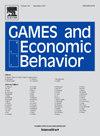“自愿最后通牒博弈中的均衡博弈:仁慈不能被勒索”-评论
IF 1
3区 经济学
Q3 ECONOMICS
引用次数: 0
摘要
Smith和Wilson(2018)认为,最后通牒博弈中的行为可能是由于典型的实施,其中参与者没有机会选择退出游戏。根据Smith(1759)的见解,他们认为让游戏变得自愿性会增加平衡游戏的比率。他们进行了一个增强的最后通牒游戏,在这个游戏中,响应者首先决定是否参与,并将他们的实验数据与文献中的程式化事实进行比较,报告称“均衡游戏的比例要高得多……比之前报道的要多”。然而,他们没有运行标准版本的最后通牒游戏作为对照。为了确保他们的解释是合理的,我们对他们的增强游戏和类似的标准最后通牒游戏进行了实验。在我们的数据中,均衡游戏的比率在增强游戏中并不高。因此,我们发现没有证据支持Smith和Wilson(2018)的主要结论。本文章由计算机程序翻译,如有差异,请以英文原文为准。
“Equilibrium play in voluntary ultimatum games: Beneficence cannot be extorted” - Comment
Smith and Wilson (2018) argue that behavior in the ultimatum game may be due to the typical implementation, in which players are not given the opportunity to opt out of the game. Using insights from Smith (1759), they suggest that making play voluntary would increase rates of equilibrium play. They conducted an augmented ultimatum game where the responder first decides whether to participate, and compare their experimental data to stylized facts from the literature, reporting “far higher rates of equilibrium play...than heretofore reported”. However, they do not run standard versions of the ultimatum game as a control. To ensure their interpretation is warranted, we conducted experiments of both their augmented game and an analogous standard ultimatum game. In our data, rates of equilibrium play were not higher in the augmented game. Thus, we find no support for the primary conclusion of Smith and Wilson (2018).
求助全文
通过发布文献求助,成功后即可免费获取论文全文。
去求助
来源期刊

Games and Economic Behavior
ECONOMICS-
CiteScore
1.90
自引率
9.10%
发文量
148
期刊介绍:
Games and Economic Behavior facilitates cross-fertilization between theories and applications of game theoretic reasoning. It consistently attracts the best quality and most creative papers in interdisciplinary studies within the social, biological, and mathematical sciences. Most readers recognize it as the leading journal in game theory. Research Areas Include: • Game theory • Economics • Political science • Biology • Computer science • Mathematics • Psychology
 求助内容:
求助内容: 应助结果提醒方式:
应助结果提醒方式:


